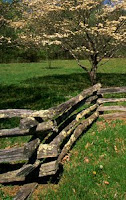During my latest journey through Thoreau's Journal, I was struck by this amazing sentence from January 27, 1852. It strikes an uncharacteristically melancholy note for Thoreau, it takes more notice of the inner life of Thoreau's neighbors than is usual for him, and at 436 words it must surely be the longest sentence in his collected works. (If any knows of a longer one, let me know!) I'm not aware of any critic who has taken notice of it.
As I stand under the hill beyond J. Hosmer’s and look over the plains westward toward Acton and see the farmhouses nearly half a mile apart, few and solitary, in these great fields between these stretching woods, out of the world, where the children have to go far to school; the still, stagnant, heart-eating, life-everlasting, and gone-to-seed country, so far from the post-office where the weekly paper comes, wherein the new-married wife cannot live for loneliness, and the young man has to depend upon his horse for society; see young J. Hosmer’s house, whither he returns with his wife in despair after living in the city, — I standing in Tarbell’s road, which he alone cannot break, — the world in winter for most walkers reduced to a sled track winding far through the drifts, all springs sealed up and no digressions; where the old man thinks he may possibly afford to rust it out, not having long to live, but the young man pines to get nearer the post-office and the Lyceum, is restless and resolves to go to California, because the depot is a mile off (he hears the rattle of the cars at a distance and thinks the world is going by and leaving him); where rabbits and partridges multiply, and muskrats are more numerous than ever, and none of the farmer’s sons are willing to be farmers, and the apple trees are decayed, and the cellar-holes are more numerous than the houses, and the rails are covered with lichens, and the old maids wish to sell out and move into the village, and have waited twenty years in vain for this purpose and never finished but one room in the house, never plastered nor painted, inside or out, lands which the Indian was long since dispossessed [of], and now the farms are run out, and what were forests are grain-fields, what were grain-fields, pastures; dwellings which only those Arnolds of the wilderness, those coureurs de bois, the baker and the butcher visit, to which at least the latter penetrates for the annual calf, — and as he returns the cow lows after, — whither the villager never penetrates, but in huckleberry time, perchance, and if he does not, who does? — where some men’s breaths smell of rum, having smuggled in a jugful to alleviate their misery and solitude; where the owls give a regular serenade; — I say, standing there and seeing these things, I cannot realize that this is that hopeful young America which is famous throughout the world for its activity and enterprise, and this is the most thickly settled and Yankee part of it.




No comments:
Post a Comment